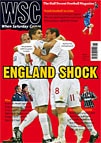 Dear WSC
Dear WSC
I read with interest Paul Joyce’s article concerning the rebranding of SSV Markranstadt as RB Leipzig in WSC 273. Only this summer it was rumoured that my club Southampton would be saved from extinction by becoming co-opted into the Red Bull sporting portfolio. While the team colours, fitting snugly with the brand, would not need to change the adding of the Red Bull moniker seemed a step too far. Surely something would be lost in fusing a global brand, with all its focus-grouped values and marketing spin, to a football club; an act of historic vandalism similar to replacing stained glass windows in a church with double glazing while nailing a satellite dish to the spire. The internet debate suggested, however, that many Saints supporters were happy to trade naming rights in exchange for the club’s survival. The same supporters had several years previously reacted angrily against a corporate branding of St Mary’s Stadium as simply the “Friends Provident Stadium” with the ensuing negative publicity resulting in a U-turn with the addition of St Mary’s to the title. Corporate patronage is not as new as we would like to imagine. The P in PSV Eindhoven stands for Philips, as in the Dutch electrical giants, with the club’s home games at the Philips Stadion. Indeed, many clubs have benefited from long-term relationships with business which may be far preferable to other ownership and financing options; a quick glance around the leagues reveals several fates far worse than “Red Bull Saints”. Football may be just a game to some but following our team is about being part of a community, feeling a connection with the friends and strangers stood next to us at the ground. It is a thread linking us to people looking out for the score on a TV screen or in a newspaper on the other side of the world. Brands by their nature seek to harness and transform these feelings to translate them into profit, in the process sullying the very spirit of our club. Barcelona’s motto is “more than a club”. Every clubs motto should be “more than a brand”.
Neil Cotton, Southampton
Search: ' coaching'
Stories
 Taylor Parkes reflects on a new book that paints a gloomy picture of how young players are treated in Britain
Taylor Parkes reflects on a new book that paints a gloomy picture of how young players are treated in Britain
In 1997, concerned that English football was falling behind in terms of youth development, the FA brought in Howard Wilkinson (then, as now, the last English manager to win the League). His mission was to produce a document which would outline the problems and propose a fresh approach; the amusingly titled A Charter for Quality still forms the basis of our youth coaching system. Its changes were far-reaching: clubs would take sole charge of recruiting and developing young players, while the age at which kids could be taken on “full time” dropped from 14 to nine. In the first half of last season, just 66 graduates of Premier League academies appeared on Premier League teamsheets, many of them confirmed benchwarmers. What went wrong?
 National tensions are expressing themselves through Belgium's two biggest clubs. John Chapman looks at the latest instalment
National tensions are expressing themselves through Belgium's two biggest clubs. John Chapman looks at the latest instalment
Anderlecht’s Marcin Wasilewski has twice made the front cover of Belgium’s leading football magazine in recent weeks: once when he was using his elbows to great effect against Standard Liège and then being stretchered off against the same club.
 Scotland's 2010 World Cup qualifying campaign was a painful experience both on and off the pitch. But Neil Forsyth refuses to be downhearted
Scotland's 2010 World Cup qualifying campaign was a painful experience both on and off the pitch. But Neil Forsyth refuses to be downhearted
Onwards Scotland march. Another major tournament without involvement, despite being in arguably the easiest qualifying group, with senior players picking up a sine die ban for an all-night bender, a manager still trying to convince the public of his suitability and an SFA leadership who increasingly resemble the committee of a provincial bowling club.
 In southern Spain, former England manager Glenn Hoddle is rebuilding the careers of young players. Steve Wilson reports
In southern Spain, former England manager Glenn Hoddle is rebuilding the careers of young players. Steve Wilson reports
It would be understandable for the players of Notts County to be pinching themselves at the thought of pre-season under the guidance of Sven-Göran Eriksson. The chance to work with a former England manager, despite career paths that appeared to have closed off such a possibility, might appear unique to them. Elsewhere, however, the same, equally unexpected opportunity has befallen another set of hopefuls. At least four of whom would give glowing reports as to the redemptive qualities such an experience brings.